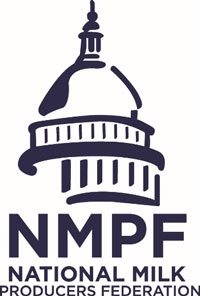
“National Milk has worked closely with House and Senate members on the tax reform conference package to achieve a positive outcome for dairy farmers and their cooperatives, and we’re pleased that conferees have completed work on a package that should provide important relief. The final compromise to address the loss of the Section 199 deduction will help protect farmer-owned businesses from a major tax increase at a time when America’s farm sector is struggling with low commodity prices and reduced incomes.
“America’s dairy farmers, who overwhelmingly rely on cooperatives to market their milk, appreciate the determined efforts by Sens. John Hoeven (R-ND) and John Thune (R-SD), as well as multiple House members, including Agriculture Committee Chairman Mike Conaway (R-TX), to seek a fair and reasonable solution to this challenge. Their efforts will help prevent a higher tax bill for cooperatives and avert the loss of economic activity in rural communities that these businesses help generate. We’re also grateful for the numerous senators on both sides of the aisle who elevated this issue during the debate.
“At issue is the loss of the benefit that both farmers and cooperative businesses enjoy from the Section 199 deduction, also known as the Domestic Production Activities Deduction (DPAD). This important provision of the tax code applies to proceeds from agricultural products marketed through cooperatives, making the Section 199 an important means of reducing taxation for farmers and cooperatives alike. Cooperatives pass the vast majority of the benefit – nearly $2 billion nationwide – directly to their farmer owners, then reinvest the remainder in infrastructure improvements for the marketing and processing of food products.
“The final tax package released on Friday repeals the DPAD, but the legislation allows cooperative members to claim a new 20-percent deduction on payments from a farmer cooperative. Cooperatives would also be able to claim the 20-percent deduction on gross income less payments to patrons, limited to the greater of 50 percent of wages or 25 percent of wages plus 2.5 percent of the cooperative’s investment in property. This favorable treatment for gross income will help minimize any potential increase in the tax burden on farmer-owned cooperatives.
“NMPF believes that this provision, plus components of the bill that increase exemption levels from the federal estate tax, enhance depreciation and expensing opportunities for producers, and preserve farmers’ ability to deduct interest expenses, should help farmers and cooperatives alike. The fix offered by Sens. Hoeven and Thune recognizes that farmer cooperatives play an indispensable role in our nation’s economy and need to be treated fairly in the final tax legislation.”
“National Milk has worked closely with House and Senate members on the tax reform conference package to achieve a positive outcome for dairy farmers and their cooperatives, and we’re pleased that conferees have completed work on a package that should provide important relief. The final compromise to address the loss of the Section 199 deduction will help protect farmer-owned businesses from a major tax increase at a time when America’s farm sector is struggling with low commodity prices and reduced incomes.
“America’s dairy farmers, who overwhelmingly rely on cooperatives to market their milk, appreciate the determined efforts by Sens. John Hoeven (R-ND) and John Thune (R-SD), as well as multiple House members, including Agriculture Committee Chairman Mike Conaway (R-TX), to seek a fair and reasonable solution to this challenge. Their efforts will help prevent a higher tax bill for cooperatives and avert the loss of economic activity in rural communities that these businesses help generate. We’re also grateful for the numerous senators on both sides of the aisle who elevated this issue during the debate.
“At issue is the loss of the benefit that both farmers and cooperative businesses enjoy from the Section 199 deduction, also known as the Domestic Production Activities Deduction (DPAD). This important provision of the tax code applies to proceeds from agricultural products marketed through cooperatives, making the Section 199 an important means of reducing taxation for farmers and cooperatives alike. Cooperatives pass the vast majority of the benefit – nearly $2 billion nationwide – directly to their farmer owners, then reinvest the remainder in infrastructure improvements for the marketing and processing of food products.
“The final tax package released on Friday repeals the DPAD, but the legislation allows cooperative members to claim a new 20-percent deduction on payments from a farmer cooperative. Cooperatives would also be able to claim the 20-percent deduction on gross income less payments to patrons, limited to the greater of 50 percent of wages or 25 percent of wages plus 2.5 percent of the cooperative’s investment in property. This favorable treatment for gross income will help minimize any potential increase in the tax burden on farmer-owned cooperatives.
“NMPF believes that this provision, plus components of the bill that increase exemption levels from the federal estate tax, enhance depreciation and expensing opportunities for producers, and preserve farmers’ ability to deduct interest expenses, should help farmers and cooperatives alike. The fix offered by Sens. Hoeven and Thune recognizes that farmer cooperatives play an indispensable role in our nation’s economy and need to be treated fairly in the final tax legislation.”
The National Milk Producers Federation (NMPF), based in Arlington, VA, develops and carries out policies that advance the well-being of dairy producers and the cooperatives they own. The members of NMPF’s cooperatives produce the majority of the U.S. milk supply, making NMPF the voice of dairy producers on Capitol Hill and with government agencies. For more on NMPF’s activities, visit our website at www.nmpf.org.





